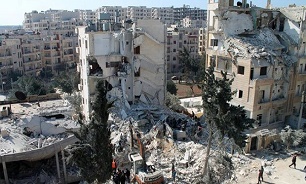All eyes on Idlib at 6th meeting on Syria in Astana
 The talks, attended by high-ranking officials from the three
ceasefire guarantor states — Russia, Iran and Turkey — as well as
representatives of the Syrian government and armed opposition, will be held on
September 13-15.
The talks, attended by high-ranking officials from the three
ceasefire guarantor states — Russia, Iran and Turkey — as well as
representatives of the Syrian government and armed opposition, will be held on
September 13-15.
So far, three zones of de-escalation have been established: in the south along the border with Jordan, in Eastern Ghouta and to the north of Homs. Consultations on the fourth and most problematic de-escalation zone in the Idlib province are ongoing.
In July, Russia, Turkey and Iran, with help of Jordan and the United States as observers, tried to coordinate a whole range of specifics on the establishment of the four safe zones, but could not agree on all the details and sign the package of documents as a whole.
Since July, three out of four zones were coordinated and announced outside of the Astana framework.
Key attendees of the sixth international meeting on Syria in Astana will be the same as in previous gatherings. The Russian delegation will be headed by special presidential envoy for Syria Alexander Lavrentiev and include Director of Middle East and North Africa Department in the Foreign Ministry Sergey Vershinin and Gen. Stanislav Gadzhimagomedov.
The Iranian delegation for Astana is usually headed by Deputy Foreign Minister for Arab and African Affairs Hossein Jaberi Ansari, while the Turkish team is led by the Foreign Ministry's Deputy Undersecretary Sedat Onal.
The Syrian government delegation is led by Syria's Envoy to the United Nations in New York Bashar Jaafari.
The UN side will be represented by Special Envoy for Syria Staffan de Mistura, as well as a group of experts headed by Milos Strugar.
Jordan and the United States will act as observers. US acting assistant secretary of state for Near Eastern Affairs David Satterfield has confirmed his participation, according to the Kazakh Foreign Ministry. He will be a new person at the talks.
Interestingly, the Syrian opposition delegation will this time will include not only representatives of military factions, but also a political element. Therefore, Yahya Aridi is attending the talks as a spokesman for the High Negotiations Committee, a negotiating body of the political opposition that always attends the UN-led intra-Syrian talks in Geneva. He attended the talks in Astana only once in January, when the country's future constitution was discussed.
What is important is that Astana meeting comes just after Russian Foreign Minister Sergey Lavrov's visits to Saudi Arabia and Jordan, where de-escalation on Syria presumably was on top of the agenda.
On Sunday, Lavrov met with King Salman bin Abdulaziz Al Saud and Foreign Minister Adel Jubeir in Saudi Arabia. On Monday, he spoke to his Jordanian counterpart Ayman Safadi and King Abdullah II of Jordan in Amman.
After the meeting, Safadi expressed hope that "all de-escalation zones in Syria will be established as soon as possible."
Humanitarian aid, detainees and demining are also expected to be on the agenda at Astana-6, as they are part of the package of seven documents which are in the process of being finalized.
The adoption of the package can become the most important outcome of the forthcoming talks. A plenary session on Friday will demonstrate how successful the talks will have been.
